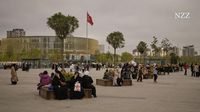On Wednesday, April 23, 2025, the bustling metropolis of Istanbul, Turkey, was rocked by a powerful earthquake measuring 6.2 on the Richter scale. The quake struck at 12:49 PM local time, with its epicenter located in the Marmara Sea, approximately 40 kilometers southwest of the city. This seismic event not only sent shockwaves throughout Istanbul but also reverberated across neighboring regions, including parts of Greece and Bulgaria.
According to the Turkish Disaster and Emergency Management Authority (AFAD), the earthquake lasted about 13 seconds and was accompanied by over 120 aftershocks, the most significant of which registered a magnitude of 5.9. The tremors caused widespread panic, leading many residents to flee their homes in fear. Reports indicate that at least 236 people sustained injuries, primarily from jumping from heights in a desperate attempt to escape the shaking buildings. Fortunately, there were no immediate reports of fatalities.
Eyewitness accounts describe chaotic scenes as people rushed to the streets, some in a state of sheer panic. "We were having breakfast when we first felt a small quake. Later, as we went to the bathroom to freshen up, I saw the shaking intensify," one resident recounted to Euronews. Notably, the earthquake struck during a holiday when many children were out of school, exacerbating the situation.
In the aftermath, Interior Minister Ali Yerlikaya confirmed that 378 reports of structural damage had been filed, with 12 buildings evacuated as a precaution. Only one building, a nearly derelict structure in the historic Fatih district, collapsed. Despite the structural concerns, authorities reassured the public that they were closely monitoring the situation. "We are fortunate that there seem to be no major problems for now," President Recep Tayyip Erdogan stated during a national sovereignty event, expressing hope for the safety of the citizens.
Experts have long warned about Istanbul's vulnerability to significant earthquakes, citing a 64% probability of a magnitude 7 quake occurring by 2030. The city is situated on major fault lines, making it particularly susceptible to seismic activity. Following the devastating earthquakes in February 2023, which resulted in over 53,000 deaths in Turkey alone, the urgency for building safety and disaster preparedness has intensified. Many buildings in Istanbul—estimated at around 1.5 million—are considered at risk for earthquake damage.
As the tremors continued throughout the day, residents were advised to stay outdoors and avoid entering potentially damaged structures. The authorities opened sports halls and mosques as temporary shelters for those unwilling to return home. "We live in a building that is on a solid foundation, so we feel safe. But we've decided to wait a little longer before going back home, God willing," commented another Istanbul resident.
The earthquake's impact was felt far beyond Turkey's borders, with reports of tremors reaching parts of Greece and Bulgaria, particularly in northeastern Greece along the Evros River. Greek media noted that while people experienced fear, there were no significant damages reported in those regions.
Despite the immediate aftermath appearing relatively calm, experts caution that the main quake may still be on the horizon. Seismologist Naci Görür warned on social media that the main seismic event could still occur, suggesting that the recent aftershocks might have increased the stress on the fault lines. The Potsdam Helmholtz Centre for Geosciences labeled this earthquake as the most significant in the region in the past 25 years, raising alarms among the scientific community regarding the potential for a more severe quake.
Transportation Minister Abdulkadir Uraloglu reported no damage to highways, airports, or public transit systems following initial inspections. Nonetheless, the psychological toll on residents has been profound, with many expressing fears of future quakes. "We thought perhaps a plane had crashed into the building when everything started shaking," described a traveler at Istanbul Airport, who was present during the quake. "We ran downstairs and are now waiting outside. The airport has yet to provide any information, and we feel trapped here."
In the wake of the earthquake, President Erdogan assured citizens that emergency services were on high alert and closely monitoring developments. The government has initiated urban reconstruction projects to retrofit vulnerable buildings and mitigate risks from future earthquakes.
As the city grapples with the immediate aftermath of the quake, residents are left to cope with the uncertainty of what lies ahead. The memories of the catastrophic earthquakes earlier in 2023 remain fresh, and the fear of another disaster looms large. The Turkish government, along with local authorities, continues to emphasize the importance of preparedness and resilience in the face of nature's unpredictability.
In conclusion, while the immediate effects of the April 23 earthquake appear manageable, the potential for a more severe seismic event remains a pressing concern for Istanbul and its residents. As the city moves forward, the lessons learned from past earthquakes will undoubtedly shape its future preparedness and response strategies.






